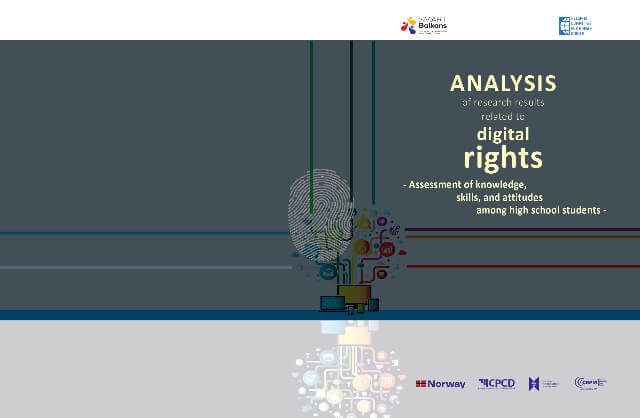Analysis of research results related to digital rights – Assessment of knowledge, skills, and attitudes among high school students

In today’s interconnected world, where digital technologies shape our daily interactions and information flows at unprecedented speeds, understanding the importance of personal data protection and the right to privacy is essential for young people. Through social media platforms to online shopping, individuals are constantly sharing personal information, often without fully understanding the potential consequences and dangers. From social media platforms to online shopping, individuals are constantly sharing personal information without fully understanding the potential consequences and dangers.
According to the State Statistical Office data, in the first quarter of 2023, 88.0% of households had access to the Internet from home. Of the total population aged 15 to 74, 85.3% used the Internet, and 67.7% used it several times during the day.
In the first three months of 2023, 87.4% of the 15-24 age group used the Internet to engage in social networking activities such as creating user profiles and sending messages or other attachments on platforms like Facebook and Twitter.
Educating young people about the importance of protecting their personal data helps them make informed decisions about their online activities, reducing the risks of identity theft, data privacy violations, and data misuse. Additionally, promoting respect for privacy rights instills a sense of responsibility in young individuals, fostering a digital society culture that values and protects privacy.
Education on human rights and digital rights is an integral part of preparing young people for active participation in the digital society. As the digital landscape continues to evolve, so do the ethical and legal considerations surrounding online behavior and interaction. By providing young people with information about their digital rights, such as freedom of expression, access to information, and protection from online harassment and surveillance, we empower them with the knowledge and skills to stand up for their rights and navigate the digital space confidently. Furthermore, integrating human rights education into digital literacy curricula promotes critical thinking skills and empathy, enabling young people to identify and challenge injustice and discrimination in both online and offline environments.
Media literacy is a crucial skill for young people to navigate the vast amount of information available online. In an era in which misinformation and fake news proliferate, the ability to analyze, evaluate, and interpret media content is essential for making informed decisions and meaningful participation in civic and political-social discourse. By teaching young people to discern credible sources, identify biases, and recognize manipulation tactics, we equip them with the tools to resist manipulation, form evidence-based opinions, and engage constructively in public dialogue. Moreover, media literacy encourages young individuals to create responsible and ethical content, contributing positively to digital culture and fostering a more informed and democratic society.
It is crucial for young people to learn about cyber-violence and digital gender-based violence, as these forms of abuse are becoming more common in our digitally connected world, impacting mental health, safety, and well-being. Educating young people on these issues equips them with the knowledge to identify, prevent, and address such violence, promoting a culture of respect and empathy online.
Additionally, understanding the legal and social implications empowers them to advocate for themselves and others, ensuring a safer and more supportive digital environment. Such education is essential to building resilient, informed, and responsible digital citizens who can contribute to positive online communities.
To achieve this goal, it is essential to identify the weaknesses in young people’s knowledge and information through an analytical questionnaire in order to prepare essential materials to train and enhance the understanding of high school students on these topics.



